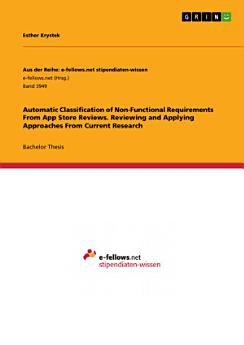Automatic Classification of Non-Functional Requirements From App Store Reviews. Reviewing and Applying Approaches From Current Research
Esther Krystek
ستمبر 2021 · Aus der Reihe: e-fellows.net stipendiaten-wissen کتاب 3949 · GRIN Verlag
ای بک
33
صفحات
family_home
اہل ہے
info
reportدرجہ بندیوں اور جائزوں کی تصدیق نہیں کی جاتی ہے مزید جانیں
اس ای بک کے بارے میں
Bachelor Thesis from the year 2021 in the subject Business economics - Miscellaneous, grade: 1,3, University of Mannheim, language: English, abstract: The thesis addresses a part of the requirements engineering process (RE), namely the treatment of non-functional requirements. Requirements are commonly divided into functional requirements (FRs) and non-functional requirements (NFRs). NFRs address the non-functional aspects of a system, for example, its user interface. The thesis lays the theoretical background and explores the general nature of NFRs including different taxonomies of NFRs. It then looks closely at NFRs in the context of mobile applications. In their marketplaces, so-called App Stores, users can express their opinion about an app after downloading and using it. Software developers can collect requirements straight from these reviews. This can help them improve their software to meet users' expectations. Due to the vast amount of review data manual inspection is tedious, time-consuming, cumbersome, or even infeasible. Tools to automatically classify such reviews might aid with this problem. However, there is still no solution to automatically extract NFRs from app store reviews and classify them into different types in practice. The thesis, therefore, assesses the current state of research in developing automated solutions to classify NFRs from app store reviews. It analyzes several past approaches to automatically classify NFRs from app store reviews using machine learning and looks at the performance of different algorithms used for these approaches. It states that the so-called Support Vector Machine (SVM) algorithm performed best in the settings analyzed. The second practical part of the thesis then applies this SVM algorithm onto a given dataset with labeled reviews using Python. The reviews are classified into either one of these categories or no category at all: Usability, Dependability, Performance, and Supportability.
اس ای بک کی درجہ بندی کریں
ہمیں اپنی رائے سے نوازیں۔
پڑھنے کی معلومات
اسمارٹ فونز اور ٹیب لیٹس
Android اور iPad/iPhone.کیلئے Google Play کتابیں ایپ انسٹال کریں۔ یہ خودکار طور پر آپ کے اکاؤنٹ سے سینک ہو جاتی ہے اور آپ جہاں کہیں بھی ہوں آپ کو آن لائن یا آف لائن پڑھنے دیتی ہے۔
لیپ ٹاپس اور کمپیوٹرز
آپ اپنے کمپیوٹر کے ویب براؤزر کا استعمال کر کے Google Play پر خریدی گئی آڈیو بکس سن سکتے ہیں۔
ای ریڈرز اور دیگر آلات
Kobo ای ریڈرز جیسے ای-انک آلات پر پڑھنے کے لیے، آپ کو ایک فائل ڈاؤن لوڈ کرنے اور اسے اپنے آلے پر منتقل کرنے کی ضرورت ہوگی۔ فائلز تعاون یافتہ ای ریڈرز کو منتقل کرنے کے لیے تفصیلی ہیلپ سینٹر کی ہدایات کی پیروی کریں۔








